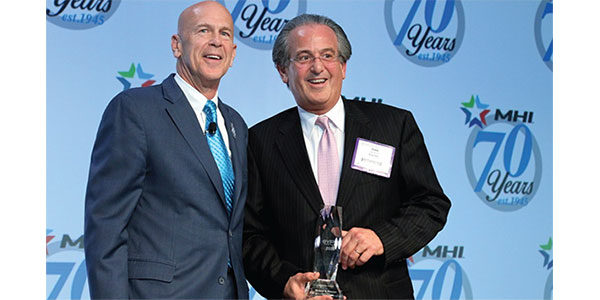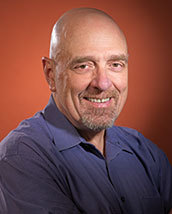Mentoring the next generation: interview with Mike Romano

Earlier this year, MHI honored Mike Romano, president and CEO of material handling solution specialist Associated, with its first Young Professional Network Mentor Award. The award is given to an MHI member who promotes and encourages professional development in the industry.
MHI, a trade association for the material handling, logistics, and supply chain industry, said at the time it had established the award to recognize a member "who offers professional guidance, instills and nurtures talent, advocates for employees and their professional development, possesses a commitment to the company and its people, and serves as a positive and inspiring role model."
Judging by his record of service to the industry, Romano, a 35-year veteran of the material handling business, certainly fills that bill. He has been an active participant in industry organizations, serving on the Material Handling Equipment Distributors Association's (MHEDA) board of directors and executive committee, including a term as president. He has also served on the College-Industry Council of Material Handling Education (CICMHE) Foundation and MHI's Education Foundation board of directors.
He recently spoke to DCV Editorial Director Peter Bradley about his efforts to attract young talent to the material handling industry and then hold onto that talent.
Q: Tell me a little bit about the mentoring efforts for which you were recently recognized by MHI.
A: I've been in the industry since 1980, but around (the year) 2000, I realized there was a significant shortage of people available to bring into the industry. We recycle people in this industry. That doesn't promote new ideas and creative concepts. So, I made that part of my initiatives as president at MHEDA and formed a committee at MHEDA to address the issue. As we saw it, the problem was that we, as an industry, were fairly transparent to the academic community, to the consumer community, etc. We were kind of behind the scenes, so when kids got out of school, they didn't think about going into the material handling industry the way they might think about going into electronics or retail. That was the biggest part, the lack of visibility.
So we worked with MHI on an industry awareness initiative. It never got a lot of traction, but what it did was at least get people to realize there were two issues that the industry faced. Number one was the shortage of people. The second was the inverse relationship that existed between the price that we get for our services and the value that they provide. We really tried to promote both of those things through that initiative. When that fell by the wayside, we started taking a more micro approach at MHEDA. We started targeting schools to work with, and we asked MHI if we could get involved with CICMHE and sponsor a professor to try to build bridges with the academic community. We did that. MHEDA has continued to be involved with CICMHE.
We have coupled that initiative and our relationships through CICMHE to target schools that we could use as feeder schools, and we actually initiated a program where we started bringing professors and two of their top students to the MHEDA convention every year, which was great. It exposed members to the kind of talent that these schools were producing.
That was on an industry level. On a more micro level, we've done the same thing in our own company. We've developed partnerships with three schools in particular—Loyola Chicago, Robert Morris University - Illinois, and Northern Illinois University—over the last couple of years.
Now, schools and colleges are not the only ones we're working with. Half of our employees have technical backgrounds. We have a whole demographic, the baby boomers, that's retiring. There was a good cross section of blue- and white-collar workers in that generation. It's a different story with the newcomers entering the work force. The parents of those kids pushed them to go to college, which has resulted in a tremendous shortage of blue-collar workers. So we work with two trade schools toward the end of making them, first of all, aware of our industry. At least 80 percent of our new technicians today are from the trade schools. We develop our own talent from the ground up.
Q: The whole idea of attracting young people to the business was the first challenge, but then we have an industry that has a high turnover rate. How do you retain people?
A: Well, each one of them has to have a mentor who is responsible for making their on-boarding and their employment experience a successful one. You can't treat someone who is new to the industry, new to the business world, the same way you treat somebody who is 10 years in. It requires very special handling. Most importantly, the mentor has to be someone other than their boss. It has to be somebody who's going to take them under their wing and show them the way, show them the ropes, and be there to answer any questions and help them overcome any obstacles.
Q: Related to all this, you've been active for a very long time in MHEDA, MHI, CICMHE, and other groups. What drives you to that? Why do you think it's important for professionals to be involved in organizations like that?
A: I believe that giving back, sharing my ideas and best practices with others toward the end of making the industry better, will make each of our businesses better in the long run, because people will appreciate and place a higher value on what we do. The industry in many sectors is commoditized and we need to elevate it beyond that, because when people go to buy something commoditized, they just look for the lowest price. We have too much value to provide and we do provide too much value to be treated that way. So, by working together, not as one organization, but as an industry, I think we can improve our position in the eyes of our customers and by doing that, individually improve each of our organizations. That is my biggest driver. The second driver is, of course, the satisfaction of giving back to something that has provided very well for me and my family and an industry that I am proud of and that I want to see elevated to a higher level.
Q: Let me go back to your work with young people. Do you see much of a difference between the current generation of young people coming into the workplace and people from a generation ago with respect to what they expect from work and what they're looking for?
A: Sure. We have an internal education program that focuses on the four generations of workers currently in our work force and how managers need to understand each group's needs and wants and characteristics and treat them differently. So part of it is an education program.
As for the up-and-coming workers, we definitely see a difference. For instance, they're less focused on money than on quality of life. It's important to them to have time for themselves, personal time, and a good work/life balance. It is also important to them to have a well-defined career path. Sometimes, they want to start moving down that path too quickly and we need to slow them down and make sure they understand that experience is part of it.
Now, on the other hand, they are much more independent. They are desirous of being empowered to do a job, and they work well independently. Their technical skill is at a much higher level than we could have counted on in prior generations. So we just need to know all the pluses as well as be aware of some of the differences in attitude. There are things that we are used to doing that they may not be willing to do, like working 12-hour days to get a job done. They would rather come up with a way to work smarter and get the job done in eight hours. So it's a matter of just learning about them.
Q: Generally, you are optimistic about the kids who are coming up?
A: Absolutely. I think our only challenge is to provide a visible and sufficiently attractive career path to keep them longer term. That is probably the biggest obstacle because of their impatience, because they want to be managers tomorrow. We see that a lot.
Related Articles

Copyright ©2024. All Rights ReservedDesign, CMS, Hosting & Web Development :: ePublishing